Psychological warfare. How the Germans stormed the "Holland Fortress"
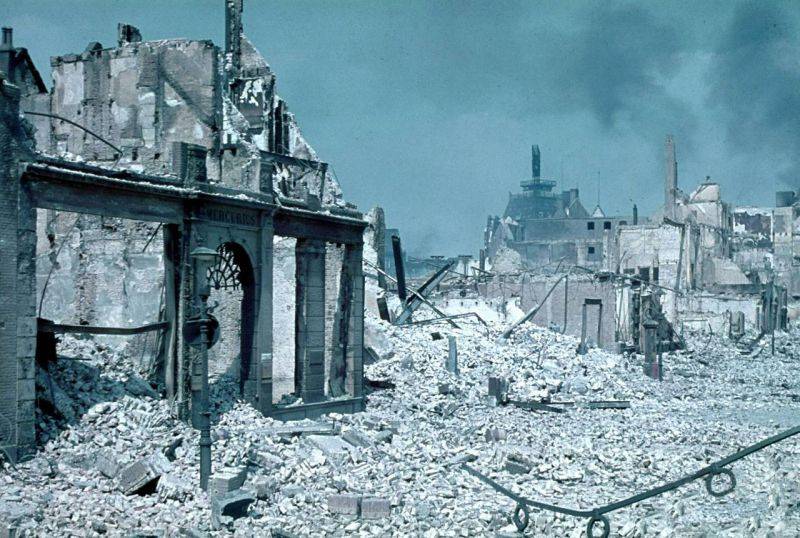
Blitzkrieg in the West. Hitler withdrew the countries of Western Europe from the game with one blow. At the same time, the strategy of psychological lightning war was used, when the enemy himself surrendered, although he had the resources and forces for serious and long-term resistance.
"Fortress Holland"
Since the end of 1939, the Abwehr, together with the propaganda department of the ground forces, waged an unprecedented information war against the Allies. Hundreds of thousands of leaflets were dumped on parts of the French army. Radio stations were entertaining and demoralizing programs. A similar situation was in Belgium.
Holland until the May invasion of 1940 lived generally calmly. The authorities and the people were holy and it was not clear why they were confident in their “neutrality." They believed that the war would bypass Holland. Although even in Holland disturbing rumors began to circulate about the ubiquitous German agents. The invasion of Norway forced the Dutch authorities to strengthen the protection of airfields and even partially plow the runways, so that the Germans could not put transporters with landing on them. An official package with documents was also found, which was addressed to Berlin. On some documents was the signature of Otto Butting, attaché of the German embassy. The documents described in detail the fortifications of the Dutch army, airfields, outposts on the roads, etc. Butting was escorted from Holland, accused of espionage.
On April 17, Amsterdam introduced a state of emergency in the country. Many pro-Nazi war figures were arrested. Preparations began to repel the invasion. Following the example of the Danish-Norwegian operation, the Dutch learned a lot about the enemy. However, this could not save the country.
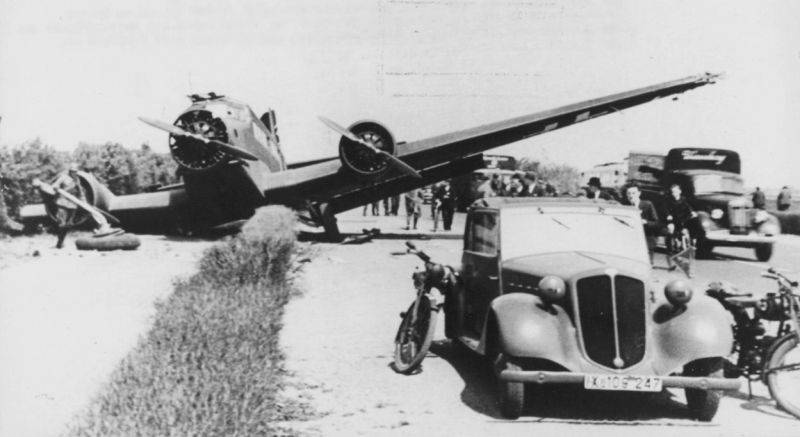
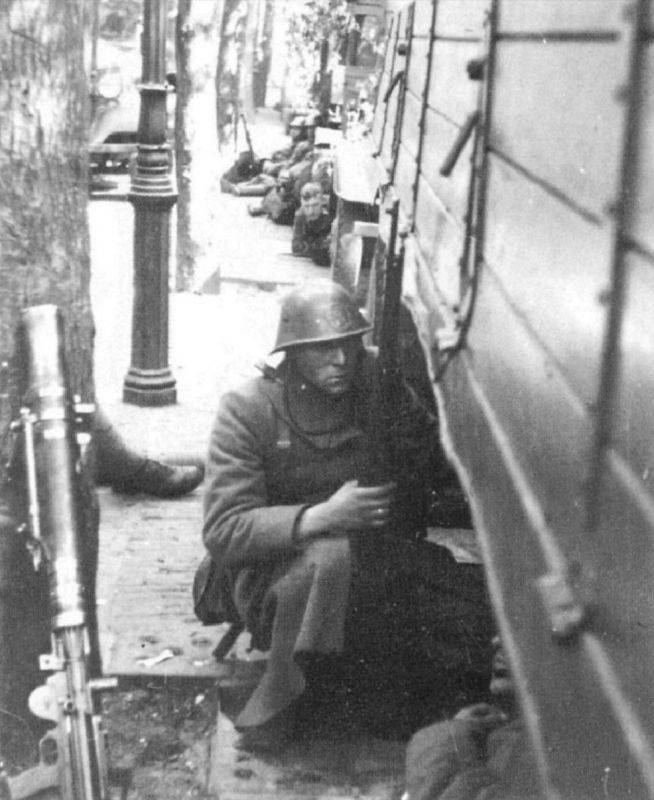
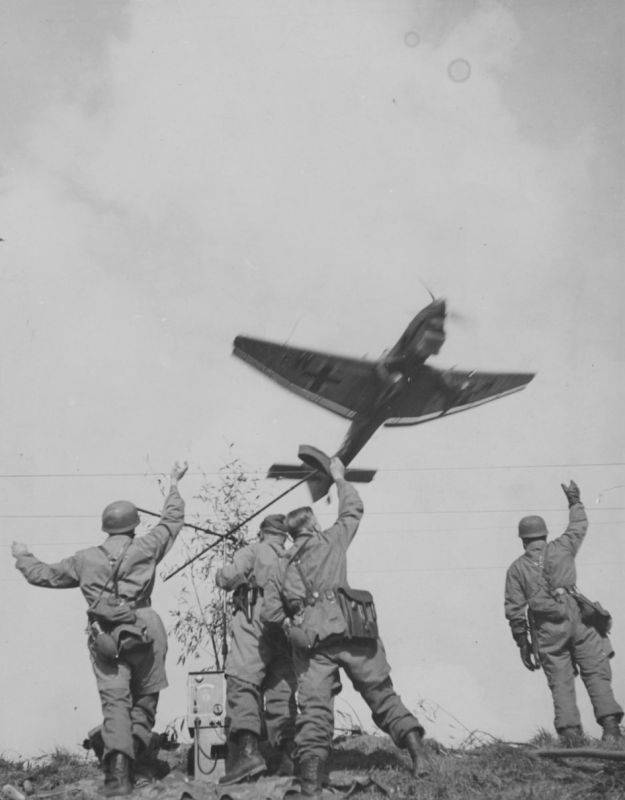
For the Fuhrer, who planned to crush France and withdraw Britain from the war, the occupation of the Netherlands and Belgium was a vital task. Back in May 1939, at a military meeting, Hitler said that it was necessary to seize a number of key positions in Holland in order to ensure the actions of the Luftwaffe (Air Force). Hitler also needed to capture the northwestern countries in order to secure the northern flank of the Western Front. Protect Northern Germany from the invasion of the Anglo-French forces. Also, the German army needed a bridgehead for the invasion of France, bypassing the Maginot Line and the base for the Navy and Air Force for operations against Britain.
It seemed that the task was relatively easy. The Dutch army was small: 8 infantry divisions, one mechanized division, three combined brigades, plus border units (in total, up to 10 combined divisions, 280 thousand people). But the matter was difficult, the strength of the Dutch troops was in numerous water barriers. Holland was called a "fortress" because of the numerous rivers, canals, bridges, dams, dams and locks that covered the country with a dense network. If you blow up bridges, destroy dams, open locks, then not German Tanks, nor the infantry could not break through quickly. And the central part of Holland - Amsterdam, Utrecht, Rotterdam and Dordrecht, was well fortified. Next was a line of water obstacles that defended the Hague. The explosion of bridges on the river Meuse will break the blitzkrieg. In addition, the enemy was waiting for the repetition of 1914 (Schlieffen's plan), that is, the breakthrough of the German divisions through the Netherlands and Belgium. On the Belgian border with were concentrated the best formations that were to enter Belgium as soon as the Germans launched the offensive.
Thus, the task was challenging. Conventional methods could drag out the war for weeks or more. A protracted war is a disaster for Germany. The German generals were horrified by this prospect. All military, material and economic calculations were against the Reich. Therefore, the German generals made up not one conspiracy against Hitler before the blitzkrieg in the West, until they believed in his "star".
How did you take the Netherlands
Hitler was not only a brilliant statesman, but also a commander. While his commanders thought in traditional patterns, the Fuhrer put forward a number of innovations that led to a quick victory. He came up with to dress up volunteer squads in the form of the Dutch military police and railway workers, they were to quickly seize bridges and open the way for tanks. The Führer also decided to maximize the capabilities of the airborne troops - two divisions, throwing paratroopers in the heart of Holland - at Amsterdam and The Hague. For this operation, the 22nd General Sponeck Infantry Division, trained and equipped as an air-landing division, and the 7th Airborne Division of General Student were assigned. Just like in Norway, paratroopers and landing troops had to take the most important airfields from The Hague, and then break into the city itself, capture the government, the queen and the top military leadership.
At the same time, a swift rush of infantry divisions into the center of Holland was worked out. In Holland, the forces of the 18th Kühler army attacked - 9 infantry, one panzer and one cavalry division. The 6th Army of Reichenau operated in the southern part of Holland and was supposed to oppose the Belgian and French troops, its participation in the capture of the Netherlands was minimal. To prevent the movement of infantry and tanks anywhere to stall, the Germans planned several operations by special forces to capture bridges across rivers and canals. So, one detachment of scouts aimed at capturing bridges across the river. Issel in the Arnhem area, other groups - on bridges over the Maas-Waal canal, through Juliana-canal in Limburg, on bridges over the Meuse in the section from Mook to Maastricht. The Germans also planned to take important bridges in the city of Nijmegen, sending there disguised shooters on a barge. Four German armored trains were supposed to support the capture groups, immediately advancing to the captured objects. Next, it was necessary to develop an attack on The Hague, take the bridges from Murdeyk, Dordrecht and Rotterdam.
Thus, a feature of the Dutch operation was the active participation of special forces. Hitler had few special forces at that time - about 1 thousand soldiers. Among them were the Dutch, devoted to the ideas of Nazism. The Dutch Nazis also had their assault squads, which were called "sports clubs." It was, though not numerous, but a real “fifth column”. Members of the "sports clubs" received special training in camps in Germany. On May 9, 1940, these detachments secretly left their places of basing and at night advanced to their goals. They were dressed in Dutch police, railway and military uniforms.
On May 10, 1940, the German offensive operation began. The blow was simultaneously delivered in the Netherlands, Belgium and Luxembourg. At the very beginning of the operation, the Germans attacked bridges on the Meuse River and across the Meuse-Waal Canal. For example, on May 9, 1940, at 23 p.m., German soldiers from the 30th Special Forces Battalion were able to secretly go to the bridge over the river. Meuse in Holland near the city of Gennep. Several commandos were in Dutch uniform and allegedly led German prisoners. They calmly ended up at an important facility, killed or captivated the guards, and ensured a quiet passage of troops. The bridge passed a German armored train, followed by a train with troops. The Germans poured into the gap, which led to the fall of the first line of defense of the Dutch army on the Meuse River and the IJssel Canal.
To the south, the Germans were able to block the bridge at Roermond, and took the city itself. They were in train uniform. Reich special forces were able to capture important bridges and crossings on the Belgian-Dutch border, the Scheldt tunnel under Antwerp. Special forces from the 800th Brandenburg Special Purpose Battalion captured bridges across the Julian Canal. There have been failures. So, a special forces group could not capture the bridge at Arnhem. The rush in preparation for the operation affected. They got the Dutch military uniform, but there weren’t enough helmets. They made an imitation, but rude. This gave them away. The 3rd company of the 800th battalion unsuccessfully attacked the crossings at Maastricht. The Germans were dressed in the form of the Dutch mounted and military police, but failed to catch the guard by surprise. The Dutch managed to blow up bridges.
As a result, the bold, albeit often unsuccessful actions of reconnaissance and sabotage groups caused a great psychological effect. All of Holland was struck by rumors of thousands of German saboteurs who were dressed in Dutch uniforms or civilian clothes. Like, the Nazis are already teeming with the country, sowing death and chaos. Allegedly they disguise themselves as peasants, postmen and priests. Panic swept over Holland, and this fear spread to other countries. Although the dressed-up special forces soldiers acted only at the border and there were few of them.
Mass arrests of all suspects began in the country. At first, 1500 German nationals and 800 members of the Dutch Nazi Party "closed" in a democratic country. The Commander-in-Chief of the Dutch Army, General Winkelmann, ordered all German citizens and immigrants from Germany to sit at home. Tens of thousands of people, including political migrants and Jewish refugees, fell under this order. For mass arrests, special police groups and internment camps were created. Arrests were also carried out by people without authority, soldiers, officers, burgomasteres, simply overly vigilant citizens. So, in Amsterdam, where it was planned to drive 800 people to an internment camp, 6 thousand were arrested. “Good Old Holland” went crazy.
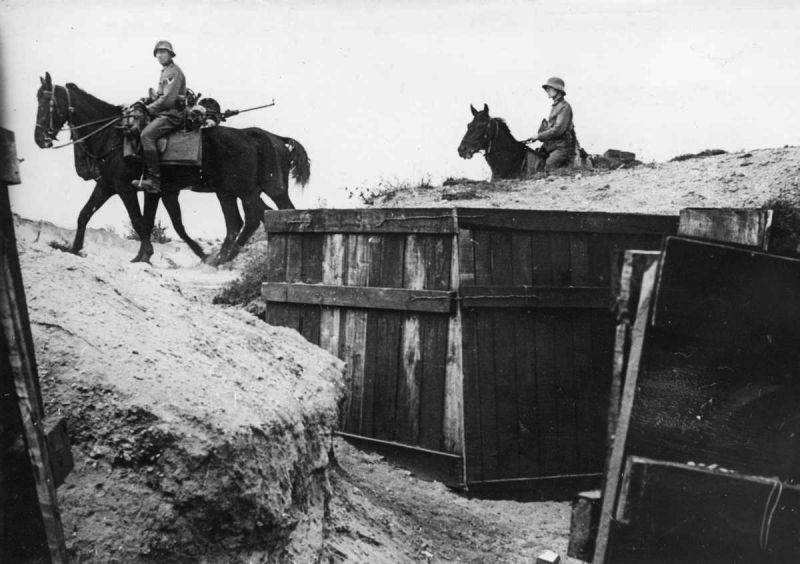
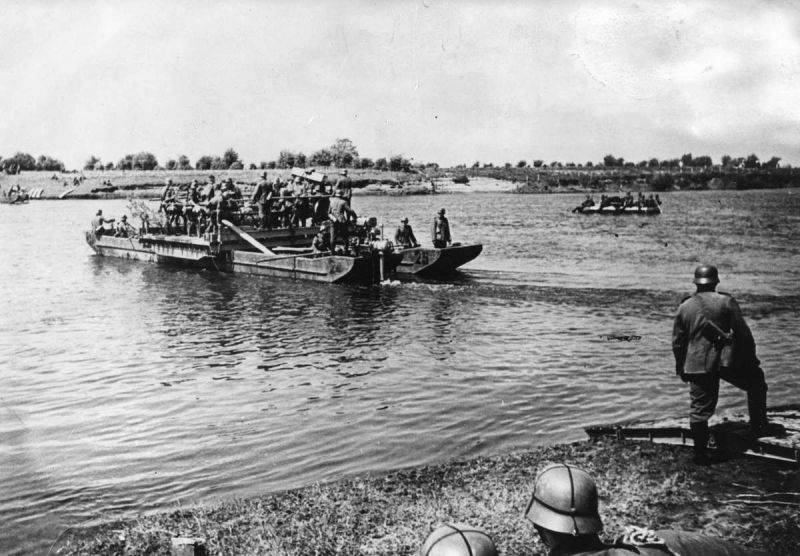
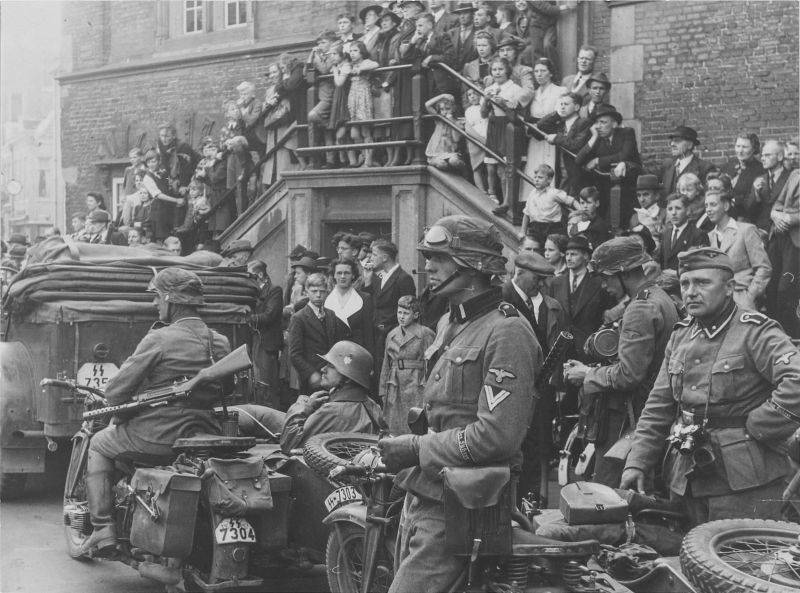
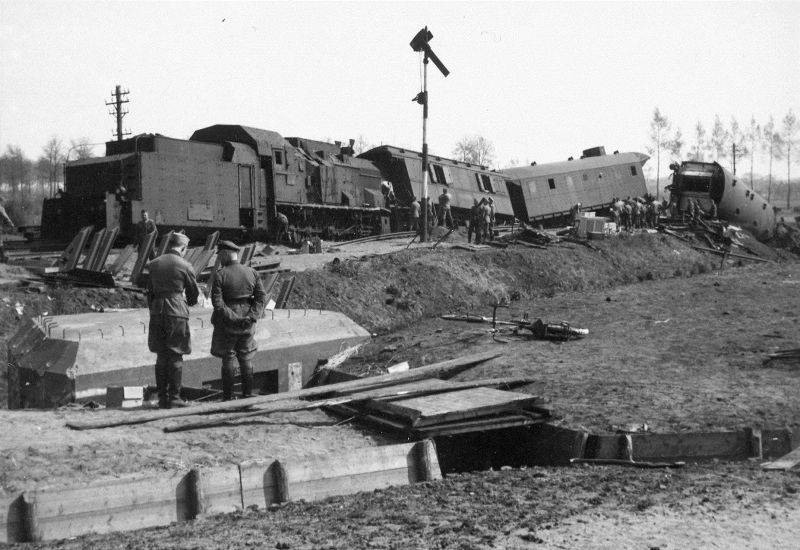
Operation in Rotterdam
The paratroopers also played a large role in the operation. Paratroopers Lieutenant Colonel Bruno Breuer captured bridges in Dordrecht and Murdeyka. The real thriller unfolded during the capture of Rotterdam and its bridges. The Germans used 12 old Heinkel-59 seaplanes in the operation, and infantrymen and sappers were loaded on them. Planes landed on the river. The Meuse in Rotterdam and the paratroopers were supposed to capture three strategic bridges. The risk was enormous: old and slow-moving, heavily loaded aircraft were easy prey for enemy fighters and anti-aircraft guns. However, low-speed flew over half the country and at 7 am appeared in Rotterdam. They sat quietly at the bridges. The Dutch did not expect anything like this and could not adequately respond to the daring attack. Inflatable boats were unloaded from seaplanes, on them infantrymen advanced to the bridges and took important objects. The Germans took three strategic bridges with the forces of an infantry company - 120 people.
The Dutch rushed to repel the bridges, but the Germans had already entrenched and repulsed the first attacks. Little reinforcements arrived - 50 paratroopers, who were dropped in the area of the city stadium. They quickly orientated themselves, seized the trams and rushed to the bridges to help their own. Also, the success of the capture and retention of bridges was facilitated by the fact that the Germans simultaneously attacked Rotterdam in another place, from the south, where the important Valhalven airfield was located. As the seaplanes approached the target, German bombers hit the airfield and diverted the Dutch air defense forces. German planes were able to cover the barracks, where many Dutch soldiers burned down. As soon as the Heinkels 111 flew away, the transport Junkers approached and threw out the battalion of paratroopers Hauptmann Schulz. The attack of paratroopers was supported by Messerschmitt-110 fighter-bomber. Soon a second wave of planes with paratroopers Hauptmann Zeidler approached. Then came the third - Yu-52 with a landing landing. Aircraft bravely landed on the airfield where the battle was going on. Two platoons of the 9th company of the 16th Infantry Regiment of Oberleutenant Schwibert landed from the aircraft. His fighters launched an offensive in the center of the airfield, parachutists attacked on the outskirts. There were more Dutch, but their fighting spirit was broken. They began to give up. Valhalven was captured.
New airplanes immediately landed on the airfield, landed a battalion of the 16th regiment. Soon, the Germans deployed anti-aircraft guns at the airport and at about noon repelled a raid by British bombers. In the meantime, transport planes landed at the airport more and more new units - a soldier of the 16th airborne regiment, a battalion of the 72nd infantry regiment. Having requisitioned vehicles from the Dutch, the Germans immediately rushed to the aid of the fighters who held the bridges in Rotterdam. However, the task was only half completed. The bridges were blocked, but the Germans were sitting on one bank, and the Dutch kept their positions on the other. The German paratroopers could not advance further, nor could they establish contact with those paratroopers who had landed in the Hague.
Nevertheless, the relatively small forces of the German army occupied the bridges and held them until the surrender of Holland on May 14, 1940. The German paratroopers held out in complete encirclement until the approach of the main forces. At the same time, the Dutch had only 8 battalions in Rotterdam. Also nearby was the Dutch fleet, from which new forces could be transferred. However, the Dutch were late with the introduction of the Navy into battle. When they did, the air was already dominated by the Luftwaffe. German bombers Neinkel 111 drowned the Dutch destroyer Van Galen, gunboats Friso and Brinio were fatally damaged.
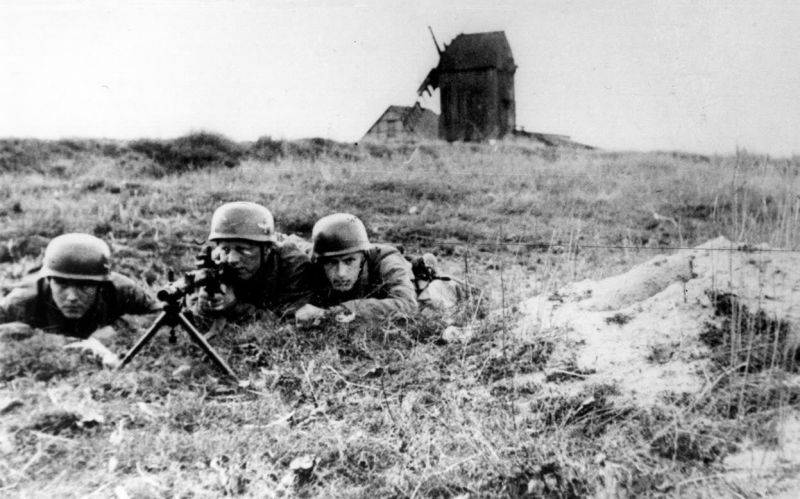
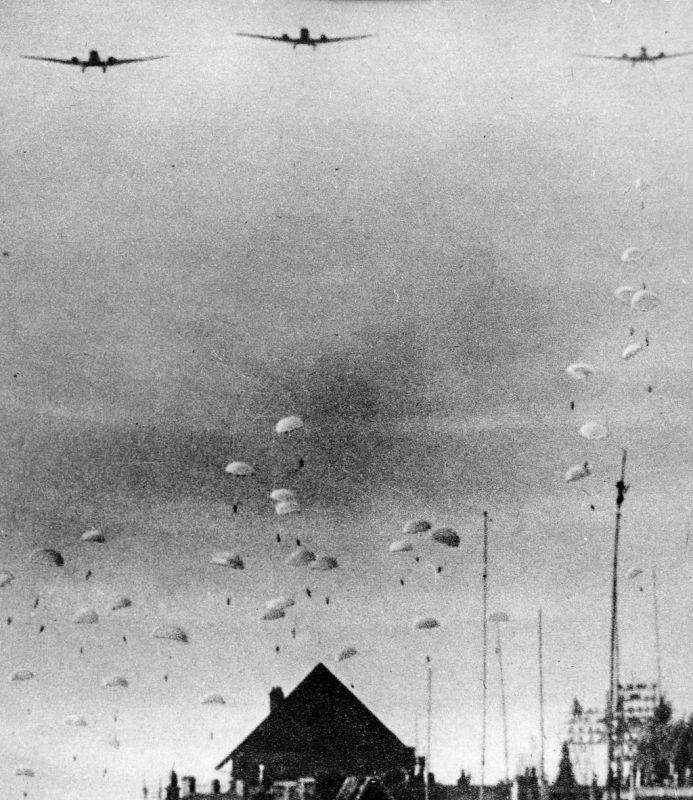
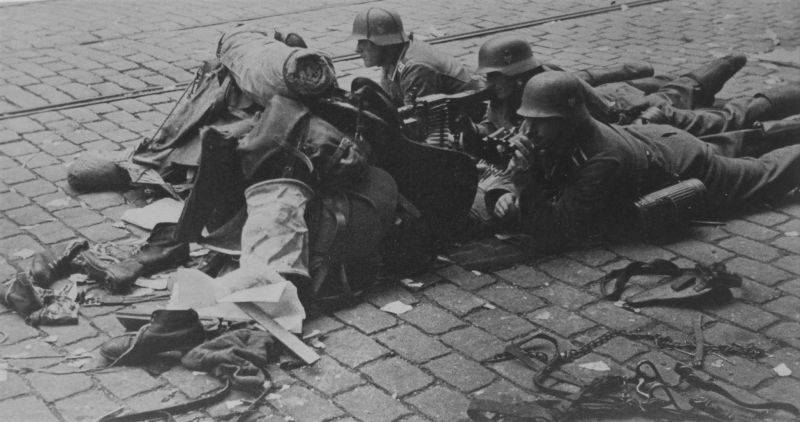
Shock and Awe
The command of the Dutch army at that time was completely demoralized and did not know what to do. So, the headquarters of the military district was located in Rotterdam and they did not know what to do in connection with the unexpected attack. The headquarters received many reports of saboteurs, paratroopers, shooting unknown persons from houses, etc. Instead of mobilizing forces and quickly attacking superior forces to repel bridges, the Dutch military searched hundreds of houses. First of all, local nationalists were suspected. Time and effort were wasted, not a single armed man was detained.
The Germans realized that the landing of paratroopers caused a panic. A flurry of alarm signals from citizens. To intensify the panic, the Nazis resorted to tricks - parachutes were stuffed. Dropped special ratchet devices that simulated shooting. This caused general confusion, it seemed to the Dutch that enemy sabotage agents, paratroopers, the "fifth column" were everywhere. That they shoot everywhere, that agents fire from houses at home or give light signals. All Holland believed that the Germans were helped by the numerous “fifth column”. Later research revealed that this is complete nonsense. The Dutch nationalists in May 1940 could not find a single rifle.
The Dutch psychologically broke down, lost the will to resist. Although militarily, everything was not as bad as it seemed. The Germans had numerous failures. For example, the plan to seize the Hague failed, where the Dutch government and the royal court were located. The Germans planned early in the morning of May 10 to capture three airfields near the Hague - Falkenburg, Ipenburg and Okenburg, and from there break into the city and capture the Dutch elite. However, here the Germans ran into strong anti-aircraft fire and stubborn ground defense. At the coastal airfield of Falkenburg, the German paratroopers could not take the Dutch base on the move. The first Junkers sat on the field and got bogged down in wet ground. As a result, they blocked the runway and other planes could not land. They had to turn back. The first planes the Dutch burned. Nevertheless, the German paratroopers took the airfield and the town near it. But burning cars prevented other planes from landing. A new wave of German paratroopers had to land on the coastal dunes. As a result, two small German groups formed - in Falkenburg and in the dunes. They had no connection with each other.
In Ipenburg, the Germans were generally defeated. The first wave of paratroopers mistakenly landed south of the airfield, in the location of the Dutch troops. Thirteen aircraft tried to land on the airfield and came under heavy fire. 11 cars caught fire. A handful of surviving fighters fought until the evening of May 10, and then surrendered. The next wave of aircraft went to an emergency landing on the Hague-Rotterdam highway. Oakenburg was also bad. The first wave of paratroopers was thrown out of there. Landing landing landed under enemy fire. The landing party suffered losses, the planes were crippled. Then the British bombed the runway and made it unsuitable for landing new German transporters.
Thus, the German landing in the Hague area landed weak, there were no reinforcements. Weak and fragmented groups of German paratroopers had no connection with each other. The Germans tried to attack the Hague, but they were easily thrown back. From a military point of view, it was a complete failure. But the failure of the German landing operation caused a new wave of panic in Holland. German planes circled around West Holland, some descended on the highway, others on the sandy coast. Civil defense observers who monitored the air reported this. Their radio transmitters were ordinary radio stations that the entire population heard. One panic news the appearance of the enemy in the rear was replaced by another. Horror swept across the country.
As a result, Dutch society and government were completely psychologically broken. People panicked and looked around for imaginary agents and saboteurs, enemy spies and paratroopers were seen everywhere. So, in the same Hague, rumors of sabotage agents dressed as Dutch agents forced some units to remove insignia. Like, we outwit the Germans. This "ingenious step" led to the fact that other Dutch units that did not remove the insignia began to take their own for a "disguised" enemy. A “friendly fire” began, order was restored only on the fourth day of the war, when troops were withdrawn from The Hague. Spy mania hit Amsterdam and The Hague, the whole country. It came to shooting vigilant citizens at their officers, attempts to detain their police and soldiers.
The authorities and citizens were sure that there were plenty of Hitler's accomplices in civilian and military uniforms. There were wild rumors about the betrayal in the leadership and among the military, about the poisoning of water in the water supply and foodstuffs, about the poisoning of roads with poisonous substances, about mysterious signs and light signals, etc. All this cleared the way for German troops advancing from the east. Thanks to the press and radio, letters and oral rumors, the whole world learned about these events. A wave of horror and panic swept the West. German intelligence and the propaganda department found that Western consumer society is prone to hysteria and generally exists on the verge of common sense and a sick imagination. And skillfully dealt a psychological and military blow to the countries of Western democracy. The Nazis skillfully combined propaganda and psychology with the then-advanced methods of war — the actions of special forces and airborne forces, diving bombers and mobile armored formations.
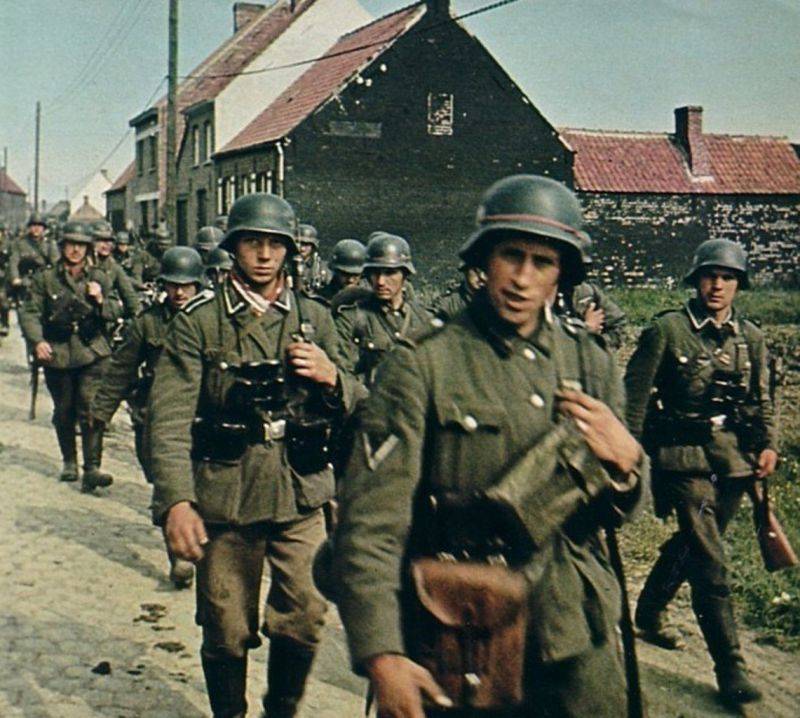
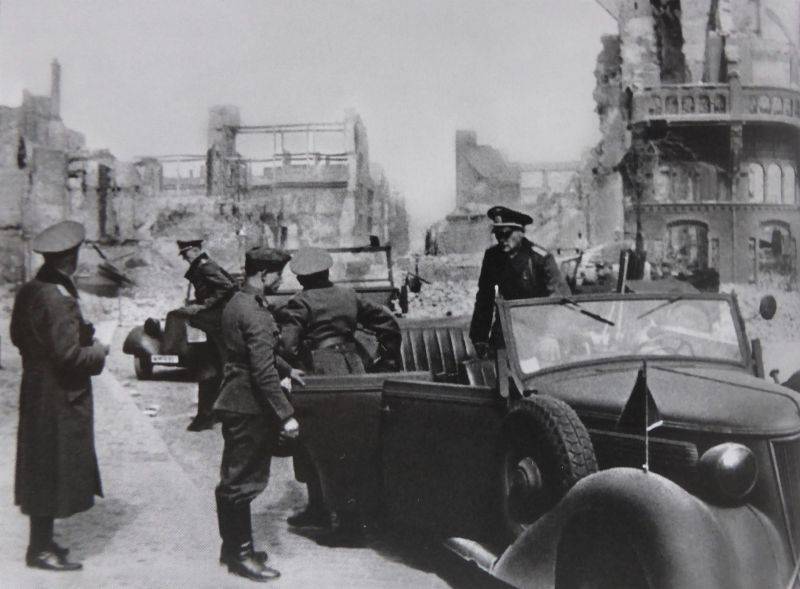
Rotterdam ashes. Surrender
The Nazis hit the Netherlands primarily not with tanks, not with artillery shelling and air strikes, not with the landing forces (Hitler’s airborne forces were few and took part in only a few relatively small operations), but with a wave of skillfully raised fear. There were few German agents and representatives of the “fifth column” in Holland - several dozen people. Special forces and paratroopers were also few, but they hit at once in many places and simultaneously. They created a feeling of the ubiquitous presence of the enemy in Holland. They caused chaos, disorder and panic.
The German embassy in the Netherlands played a large role in spreading the panic, distributing allegedly secret documents and maps. The psychological war was skillfully organized and led to great success. Even the military failures of the German forces led to psychological victories over Dutch society. The Dutch themselves did everything to quickly lose the war. As German troops advanced from the east in Holland, the Dutch army, police, and societies frantically fought spies, agents, and paratroopers. The Dutch units were feverishly deployed to Rotterdam and The Hague to fight against the insignificant forces of the German landing force and to suppress the nonexistent "Nazi uprising."
And at this time, German troops advanced rapidly. Dutch defense was falling apart before our eyes. Already on May 12, the Nazis broke through in several places the second line of the enemy’s defense. On the evening of May 12, the advanced units of the German division entered Murdeyk. On the 13th, the 9th Panzer Division, crossing the bridge, defeated the Dutch light division, which was almost entirely captured and rushed to Rotterdam. The advanced units of the 7th French Army reached the city of Breda on May 11, but they refused to attack the Germans who had captured the crossing in Murdeyka. They wanted to wait for the main forces. Meanwhile, the Germans developed an offensive.
On the fifth day of the operation, May 14, 1940, the Nazis launched an air strike on Rotterdam. The day before, on the evening of May 13, the tanks of the 9th Panzer Division from the south reached the bridges over the Meuse in Rotterdam. But the Germans could not force the river, the bridges were under fire. It was urgent to occupy Rotterdam, otherwise the offensive would stop. The Dutch refused to give up. Then they decided to strike an air strike and force the river under cover of bombing.
On the morning of May 14, Colonel Sharo, the commander of the Rotterdam garrison, was warned that if you don’t add up weaponthen there will be a bombardment. Sharo hesitated and asked for command. Negotiations have begun. But the bombers were already on their way and by 3 o’clock in the afternoon they were above Rotterdam. The pilots did not know about the outcome of the negotiations, they were told that if everything goes well, the ground forces will signal red missiles. However, when Heinkeli 111 approached the city, the Dutch air defense opened heavy fire. In addition, the city was in smoke, a tanker was blazing in the port. At first, the pilots simply did not notice the red rockets that the Germans launched (according to another version, the strike was deliberate). 57 out of 100 bombers managed to drop their cargo (97 tons of landmines). The city center was on fire. The bombs fell into port oil storage facilities and margarine plants, and from there the wind drove the flame into the old part of Rotterdam, where there were many old buildings with wooden structures.
The result was an act of air terror. Killed about a thousand people, was even more injured and crippled. This horror before the German Air Force finally broke Holland. The garrison of Rotterdam laid down his arms. Queen of the Netherlands Wilhelmina and the government fled to London. The Dutch military and merchant fleet under the command of Admiral Furstner also left the Netherlands - there was still a huge colonial empire. The Dutch fleet (500 ships of all sizes with a total displacement of 2,7 million tons and with crews of 15 thousand people) seriously replenished the naval forces of the Allies.
In the evening of May 14, 1940, the commander in chief of the Dutch army, General Winkelmann, not wanting to take responsibility for the destruction of the country, ordered the troops to lay down their arms and announced the surrender of the country. The Dutch decided that they would wait for real help from the Anglo-French, and attempts to further resistance would lead to the destruction of cities and mass deaths. Recent Dutch units, supported by allies, resisted in the province of Zealand, especially on the islands of Süd Beveland and Walheeren. There the Dutch surrendered or evacuated to Britain on May 16-18.
Holland fell in just five days. The Nazis got a whole developed country with unscathed railways, bridges, dams, power plants, industry and cities. Dutch troops lost more than 9 thousand killed and captured, the remaining 270 thousand surrendered or fled. German losses - over 8 thousand people and 64 aircraft.
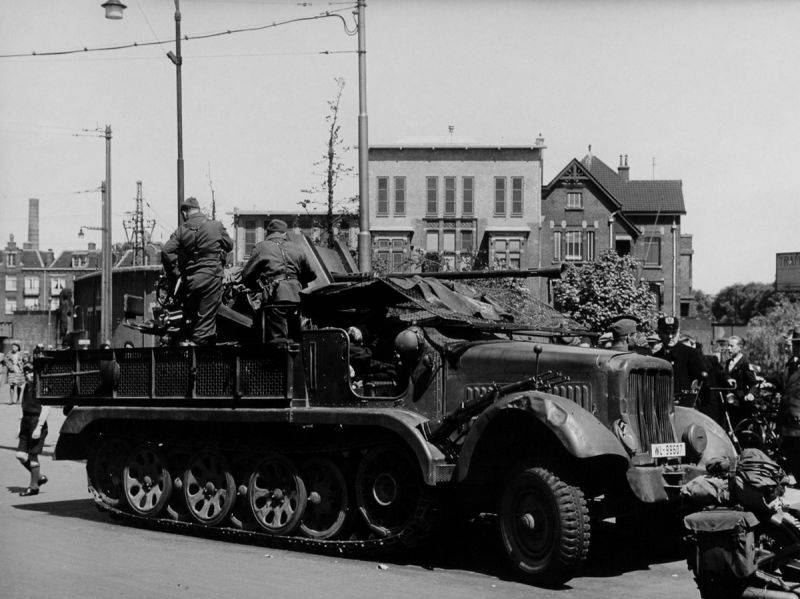
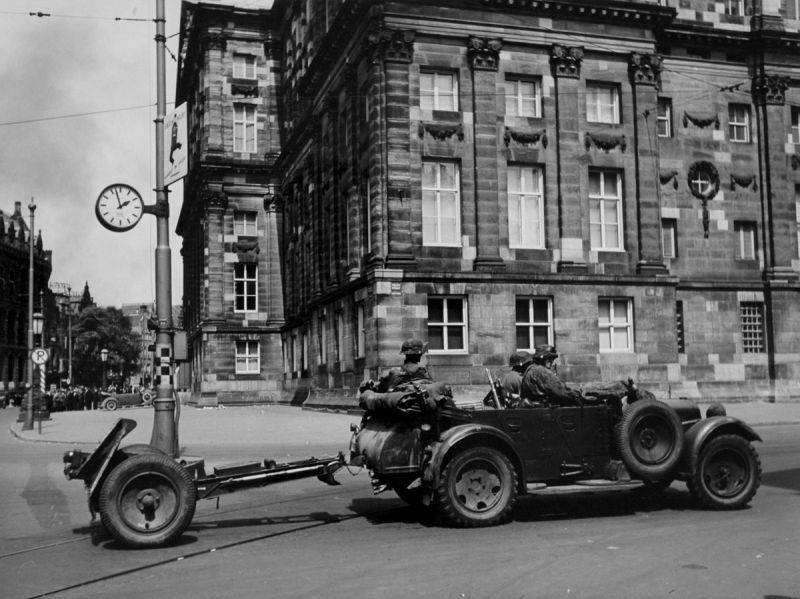
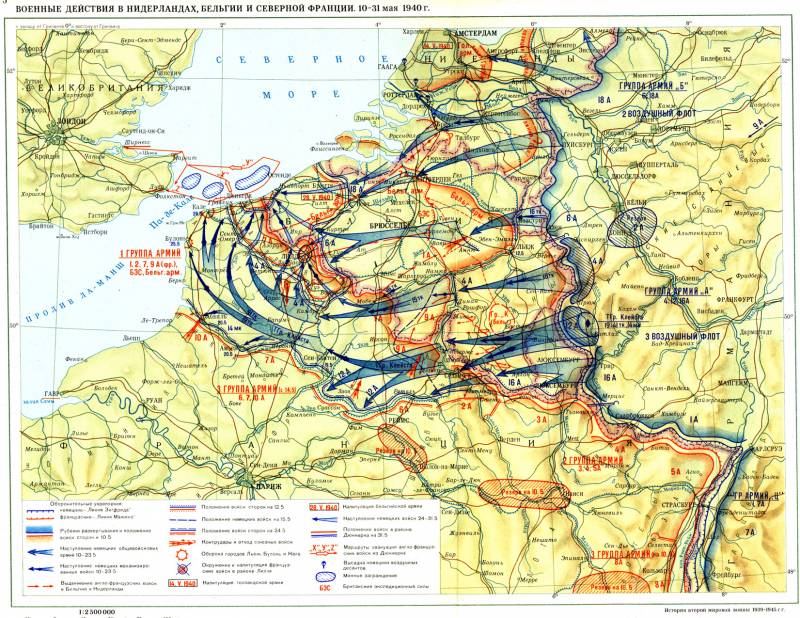
Information